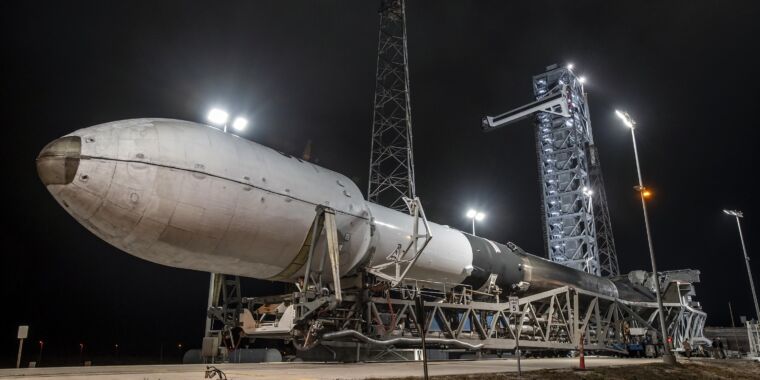- cross-posted to:
- [email protected]
- cross-posted to:
- [email protected]
Amazon announced Friday that it has purchased three Falcon 9 rocket launches from SpaceX beginning in mid-2025 to help deploy the retail giant’s network of Kuiper Internet satellites.
In a statement, Amazon said the SpaceX launches will provide “additional capacity” to “supplement existing launch contracts to support Project Kuiper’s satellite deployment schedule.” SpaceX has its own broadband satellite fleet, with more than 5,100 Starlink spacecraft currently in orbit, making it a competitor with Amazon.
Last year, Amazon bought up most of the Western world’s excess launch capacity from everyone but SpaceX, securing 68 rocket flights from United Launch Alliance, Arianespace, and Blue Origin to deploy thousands of satellites for the Kuiper broadband network. Amazon previously contracted with ULA for nine Atlas V launches to support the initial series of Kuiper launches, the first of which lifted off in October with Amazon’s first two Kuiper prototype satellites. More Atlas Vs will start launching operational Kuiper satellites next year.
SpaceX’s Falcon 9 rocket, the world’s most reliable launch vehicle, was left out of Amazon’s multibillion-dollar rocket purchase. This led to a lawsuit filed in August by shareholders of a pension fund that includes Amazon stock. The suit claims Amazon, its founder Jeff Bezos, and its board of directors breached “their fiduciary duty” and failed to consider SpaceX during the launch service procurement.
The Falcon 9 rocket is the only rocket with any openings in its launch schedule that could make up a shortfall from delays caused by Amazon’s other launch providers. SpaceX has launched 88 Falcon 9 or Falcon Heavy rockets so far this year and aims to increase the launch cadence to one flight every 2.5 days in 2024. Most of these launches are for SpaceX’s own Starlink Internet network.
Amazon’s Project Kuiper is one of several satellite “megaconstellations” at various stages of development to provide low-latency broadband connectivity to consumers, governments, and corporate customers around the world. SpaceX’s Starlink is the biggest of the group, and one of two (along with OneWeb) low-Earth orbit constellations currently providing commercial Internet service.
But once again, SpaceX has proved it will happily take money from its competitors to launch their satellites. OneWeb turned to SpaceX to launch its broadband satellites after losing access to Russian rockets in the aftermath of Russia’s invasion of Ukraine. Other communications satellite operators that compete with Starlink, including Viasat and SES, have launched their spacecraft on SpaceX rockets.
A bitter pill for Amazon indeed, and slightly embarrassing for Blue Origin.
I guess it was a matter of time given the delays for Vulcan, New Glenn, and Ariane 6, but I thought they also bought up a bunch of Atlas V launches. Their manufacturing timelines must also be slipping if they didn’t rush the test sats up sooner and start manifesting Atlases.
I thought they also bought up a bunch of Atlas V launches
They did. They bought up all remaining Atlas V launches, but it’s still nowhere near enough to launch 1600+ satellites. Incidentally, buying all the Atlas Vs kind of inadvertently screws-over Boeing Starliner, as it will no longer have a crew-rated launch vehicle
if it everonce it completes its current manifest of launches.Boeing didn’t get screwed by anyone but themselves. The whole thing is such an absolute disaster, the sooner it’s forgotten the better.
The funniest part is that Bezos got sued into paying Musk by his own shareholders
I don’t know about funny, this is actually a little disturbing to me. Like, here the decision is silly and no real principles involved, but the fact that corporations can be forced to take any technically legal action (including lobbying to change the law) to improve short term bottom line has more serious consequences elsewhere.
So much junk going up there for private companies’ profit :-(
They only make money if they provide a service people actually want. And better internet in remote places is definitely a good thing.
And all we have to trade is being able to see the stars. Oh well, at least Elon Musk got to make money, right?
Last time I checked, the stars were still there. But there’s so much pollution here, it’s hard to be sure.
Personally, I think that watching satellites is awesome too.
This is the best summary I could come up with:
Amazon announced Friday that it has purchased three Falcon 9 rocket launches from SpaceX beginning in mid-2025 to help deploy the retail giant’s network of Kuiper Internet satellites.
The suit claims Amazon, its founder Jeff Bezos, and its board of directors breached “their fiduciary duty” and failed to consider SpaceX during the launch service procurement.
Aside from the Atlas V, which Amazon will lean on to launch its first batches of satellites, none of the rockets needed to deploy the Kuiper network have flown.
But the plaintiffs in the lawsuit allege that Amazon didn’t consider the Falcon 9 rocket last year due to an intense and personal rivalry between Elon Musk, SpaceX’s founder, and Bezos.
In its first-generation architecture, Amazon’s Kuiper network will consist of 3,236 satellites flying in low-Earth orbit at an altitude of less than 400 miles, providing broadband service to customers across most of the populated world.
The company needs to deploy half of these satellites by July 2026, a deadline to maintain network authorization from the Federal Communications Commission.
The original article contains 733 words, the summary contains 173 words. Saved 76%. I’m a bot and I’m open source!





